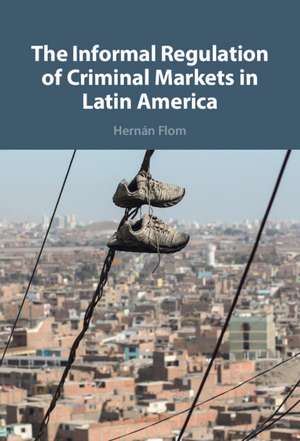The Informal Regulation of Criminal Markets in Latin America
Autor Hernán Flomen Limba Engleză Hardback – 24 aug 2022
Preț: 530.32 lei
Preț vechi: 576.44 lei
-8% Nou
Puncte Express: 795
Preț estimativ în valută:
101.48€ • 104.85$ • 84.42£
101.48€ • 104.85$ • 84.42£
Carte disponibilă
Livrare economică 27 februarie-13 martie
Livrare express 12-18 februarie pentru 34.87 lei
Preluare comenzi: 021 569.72.76
Specificații
ISBN-13: 9781009170727
ISBN-10: 1009170724
Pagini: 300
Dimensiuni: 157 x 235 x 22 mm
Greutate: 0.57 kg
Editura: Cambridge University Press
Colecția Cambridge University Press
Locul publicării:New York, United States
ISBN-10: 1009170724
Pagini: 300
Dimensiuni: 157 x 235 x 22 mm
Greutate: 0.57 kg
Editura: Cambridge University Press
Colecția Cambridge University Press
Locul publicării:New York, United States
Cuprins
1. Informal regulation of criminal markets in Latin America; 2. A theory of drug market regulation; 3. Particularistic confrontation: The persistent war between gangs and police in Rio De Janeiro; 4. Particularistic negotiation: The decentralization of police corruption and increase in violence in Rosario, Santa Fe; 5. Coordinated protection: The consolidation of centralized corruption in Buenos Aires; 6. Coordinated coexistence: The consolidation of a police-gang truce in São Paulo; 7. Regulation of criminal markets in weak institutional contexts.
Recenzii
'We long suspected that state actors in Argentina and Brazil were deeply involved in illicit narcotics markets and that this involvement was producing the interpersonal violence that periodically shakes these countries. But we didn't know how state intervention, drug trafficking, and violence intersect and interact. This book systematically dissects this relation and offers a novel and insightful perspective to understand and explain one of the most intractable issues in contemporary Latin America. Superbly written and brilliantly argued, the plethora of scholarly and policy lessons packed in this book will make it an unavoidable reference in the study of contemporary Latin America.' Javier Auyero, Joe R. and Teresa Lozano Long Professor in Latin American Sociology, University of Texas-Austin, author of The Ambivalent State: Police-Criminal Collusion at the Urban Margins
'When and how do illicit markets come to be jointly governed by states and organized crime? Hernán Flom unpacks how relations between politicians, police, and criminals generate informal regulatory arrangements that shape state and criminal violence associated with drug markets in Latin America. Insightful theorization and rich empirics make this book an important contribution to the growing research on the politics of crime.' Eduardo Moncada, Assistant Professor of Political Science, Barnard College, Columbia University and author of Resisting Extortion: Victims, Criminals, and States in Latin America (Cambridge University Press, 2021)
'This path-breaking book explains how politics in weakly institutionalized democracies shape the ways in which state authorities and the police informally regulate illicit drug markets. Theoretically insightful and empirically rich, Flom's study of four metropolitan areas in Argentina and Brazil masterfully weaves the voices of hundreds of cops and politicians into a cogent explanation of the different uses of violence and corruption to govern illicit markets in the Global South. The book is essential reading for students of governance, regulation, illicit economies, crime, and the police.' Guillermo Trejo, Professor of Political Science, University of Notre Dame
'Hernán Flom studies rigorously the relationship between elected politicians and police to explain diverse informal regulatory regimes of drug markets in Argentina and Brazil. This book contributes to theorizing the multiple, and often unexpected, ways in which states interact with drug markets, not only repressing them or enforcing the law, but also tolerating, preying upon, or protecting them. His focus on the police as a pivotal actor expands our knowledge of the intricate dynamics that connect states and criminal markets. The book is an important addition to the literature on criminal violence, drug markets, and policing.' Angélica Durán-Martínez, Associate Professor of Political Science, Director of Global Studies Ph.D. Program, The University of Massachusetts Lowell
'When and how do illicit markets come to be jointly governed by states and organized crime? Hernán Flom unpacks how relations between politicians, police, and criminals generate informal regulatory arrangements that shape state and criminal violence associated with drug markets in Latin America. Insightful theorization and rich empirics make this book an important contribution to the growing research on the politics of crime.' Eduardo Moncada, Assistant Professor of Political Science, Barnard College, Columbia University and author of Resisting Extortion: Victims, Criminals, and States in Latin America (Cambridge University Press, 2021)
'This path-breaking book explains how politics in weakly institutionalized democracies shape the ways in which state authorities and the police informally regulate illicit drug markets. Theoretically insightful and empirically rich, Flom's study of four metropolitan areas in Argentina and Brazil masterfully weaves the voices of hundreds of cops and politicians into a cogent explanation of the different uses of violence and corruption to govern illicit markets in the Global South. The book is essential reading for students of governance, regulation, illicit economies, crime, and the police.' Guillermo Trejo, Professor of Political Science, University of Notre Dame
'Hernán Flom studies rigorously the relationship between elected politicians and police to explain diverse informal regulatory regimes of drug markets in Argentina and Brazil. This book contributes to theorizing the multiple, and often unexpected, ways in which states interact with drug markets, not only repressing them or enforcing the law, but also tolerating, preying upon, or protecting them. His focus on the police as a pivotal actor expands our knowledge of the intricate dynamics that connect states and criminal markets. The book is an important addition to the literature on criminal violence, drug markets, and policing.' Angélica Durán-Martínez, Associate Professor of Political Science, Director of Global Studies Ph.D. Program, The University of Massachusetts Lowell
Notă biografică
Descriere
This book shows how police and politicians in Latin America informally regulate drug markets using corruption and violence.
